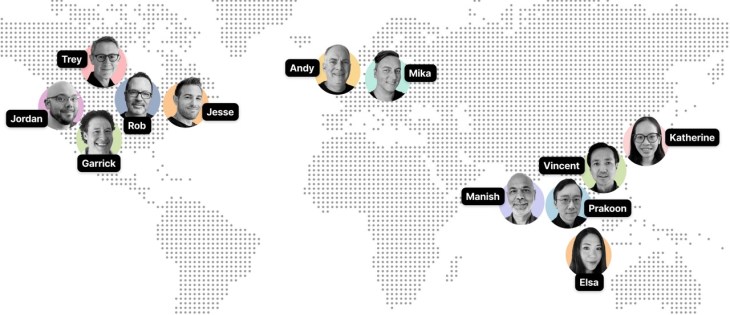Having a great founder/market fit is one of the key elements a potential investor will look at to choose whether or not to back a startup. Until AI-powered virtual travel agent app Mindtrip, I’d never met a company that seemed to be covering all of the bases in terms of founder team skills, so of course I had to take a closer look.
For the most part, founding teams are small, tight and have a unified vision as to where they’re going. It’s easy to see how they came together and for founders to look at them and think, “Yep! I can work with these guys!”
Mindtrip is an all-in-one AI-powered travel companion that helps people plan trips, including finding flights and hotels and suggesting excursions, activities and places to eat. It’s a bit like a travel agent that you can take with you when you go away, but it’s always available and remembers what you want to do and where you need to be.
Mindtrip also has 12 co-founders, who all worked together at Ariba back in the late 1990s and early 2000s.
“Once we moved on from Ariba, we started doing different startups together,” said Andy Moss, one of the co-founders. “It was always in different combinations. There would be a couple of engineers who would do one with me. And then I did one with a couple of different Ariba engineers, and it’s all kind of cross-pollinated over time.”
The co-founders are no stranger to startups, either, having built several of them. This means that they’re not naive to the demands and expectations of starting up a company, and they understand where they need to focus their energies and what isn’t so important.
“This is the fourth time around for me,” Moss said. “I was actually part of a couple of other startups. I think that changes your perspective on what’s important from a team along the way.”
Between the 12 of them, Moss said they were able to build the engineering, product and design teams that the company needs right now, and they were able to structure it to reflect the culture and vision that they want to foster. When it comes to other specialist knowledge areas — for example, HR and finance — they know when to bring in advisers and who is the best fit for their setup.
The management structure is very flat, ensuring that everyone feels as if they have some responsibility for the success of the company and it’s a collaborative experience. But Moss points out, this, too, is very much a result of their previous experience. “The engineers are actually also responsible for how it scales and all those kinds of things, instead of having a separate team that’s on operation,” he said. “You can only do this if you have a certain experience or quality of engineers.”
Experience also plays a part in how the equity in the company has been divided. “It [equity] definitely varies a little bit based upon time and experience in role and that kind of stuff,” Moss said. “But everybody has a good chunk.”
And of course, with that chunk of equity comes a sense of ownership and a desire to build not just a successful company, but also one with a culture where they want to work and will be attractive to other people joining them.
It’s an intriguing product run in an innovative way, and the demo the team showed me was really exciting; it includes powerful planning, scheduling and booking tools for a limited number of destinations. The next challenge for the company is to broaden where in the world you can plan and book trips, but judging from its closed MVP, it’s definitely one to keep a close eye on.
